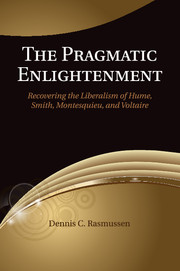Crossref Citations
This Book has been
cited by the following publications. This list is generated based on data provided by Crossref.
Callanan, Keegan
2014.
Liberal Constitutionalism and Political Particularism in Montesquieu’s The Spirit of the Laws.
Political Research Quarterly,
Vol. 67,
Issue. 3,
p.
589.
Lloyd, Henry Martyn
2018.
The French Enlightenment attempts to create a philosophy without reason: the case of Diderot and the effect of Helvétius.
Intellectual History Review,
Vol. 28,
Issue. 2,
p.
271.
Sharpe, Matthew
2019.
From Amy Allen to Abbé Raynal: Critical Theory, the Enlightenment and Colonialism.
Critical Horizons,
Vol. 20,
Issue. 2,
p.
178.
Broadie, Alexander
and
Smith, Craig
2019.
The Cambridge Companion to the Scottish Enlightenment.
Marwah, Inder S.
2019.
Liberalism, Diversity and Domination.
Rosolino, Riccardo
2020.
Countervailing Powers.
p.
11.
Hill, Lisa
2020.
Adam Smith’s Pragmatic Liberalism.
p.
187.
Orr, Bridget
2020.
British Enlightenment Theatre.
Raekstad, Paul
2021.
Adam Smith: Radical Neo-Roman and Moderate Realist.
Archiv für Geschichte der Philosophie,
Vol. 103,
Issue. 1,
p.
70.
Horn, Karen
2023.
Kampf den Klischees: Die jüngere Adam-Smith-Forschung rollt die Interpretation des schottischen Gelehrten neu auf.
Perspektiven der Wirtschaftspolitik,
Vol. 24,
Issue. 2,
p.
184.
Lubiński, Filip
2023.
Solidarność i egoizm we współczesnym dyskursie akademickim.
Dobuzinskis, Laurent
2023.
Realism, Ideology, and the Convulsions of Democracy.
Vol. 44,
Issue. ,
p.
97.
Sharpe, Matthew
2024.
Of Israel, Forst & Voltaire: Deism, Toleration, and Radicalism.
Critical Horizons,
Vol. 25,
Issue. 2,
p.
129.
Horn, Karen
2024.
Challenging the clichés: How recent scholarship refreshes the interpretation of Adam Smith’s oeuvre.
Perspektiven der Wirtschaftspolitik,



